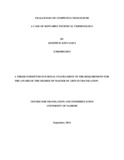| dc.description.abstract | This paper presents a study on the challenges caused by competing neologisms (newly created
terms that designate single concepts) in the development of Kiswahili technical terminology. The
languages under study are English (SL) and Kiswahili (TL). The study draws its theoretical
framework from the General Theory of Terminology (GTT) also referred to as the Traditional
Terminology Theory.
The study has been inspired by the proliferation of the multiple technical terms that refer to the
same concept which are as a result of uncoordinated creation of neologisms. This in turn causes
confusion to users of the terminology. This phenomenon is prevalent in both print and electronic
media, as well as in internet glossaries. The need for ensuring that terminology developed for use
in specialized fields is devoid of ambiguity in order to facilitate effective communication has been underscored in the study.
The study covers five chapters. Chapter one focuses on the introduction which includes:
background to the study, statement of the problem, objectives, hypotheses, rationale, scope and
limitation, theoretical framework, literature review and methodology. Chapter two comprises of
a concise discussion on typology of neologisms. Neologisms have been discussed in terms of the
processes involved in their formation.
Chapter three identifies problems posed by competing neologisms. A study corpus drawn from
the specialized fields of ICT and Linguistics has been compiled. The study corpus identifies the
source language terms (SL) in English and the resultant competing technological neologisms in
Kiswahili as the target language (TL) as well as the neologism formation processes involved.
In chapter four, data that has been collected through the questionnaire and the compiled study
corpus is discussed and analyzed in the context of the General Theory of Terminology (GTT).
Chapter five is the last chapter of the study. It focuses on summary of the main findings of the
study with close reference to the research problem, objectives, and the hypothesis of study with close reference to the research problem, objectives, and the hypotheses of the study.
The conclusion and finally the recommendations for further research have also been provided in
this chapter. | en_US |

